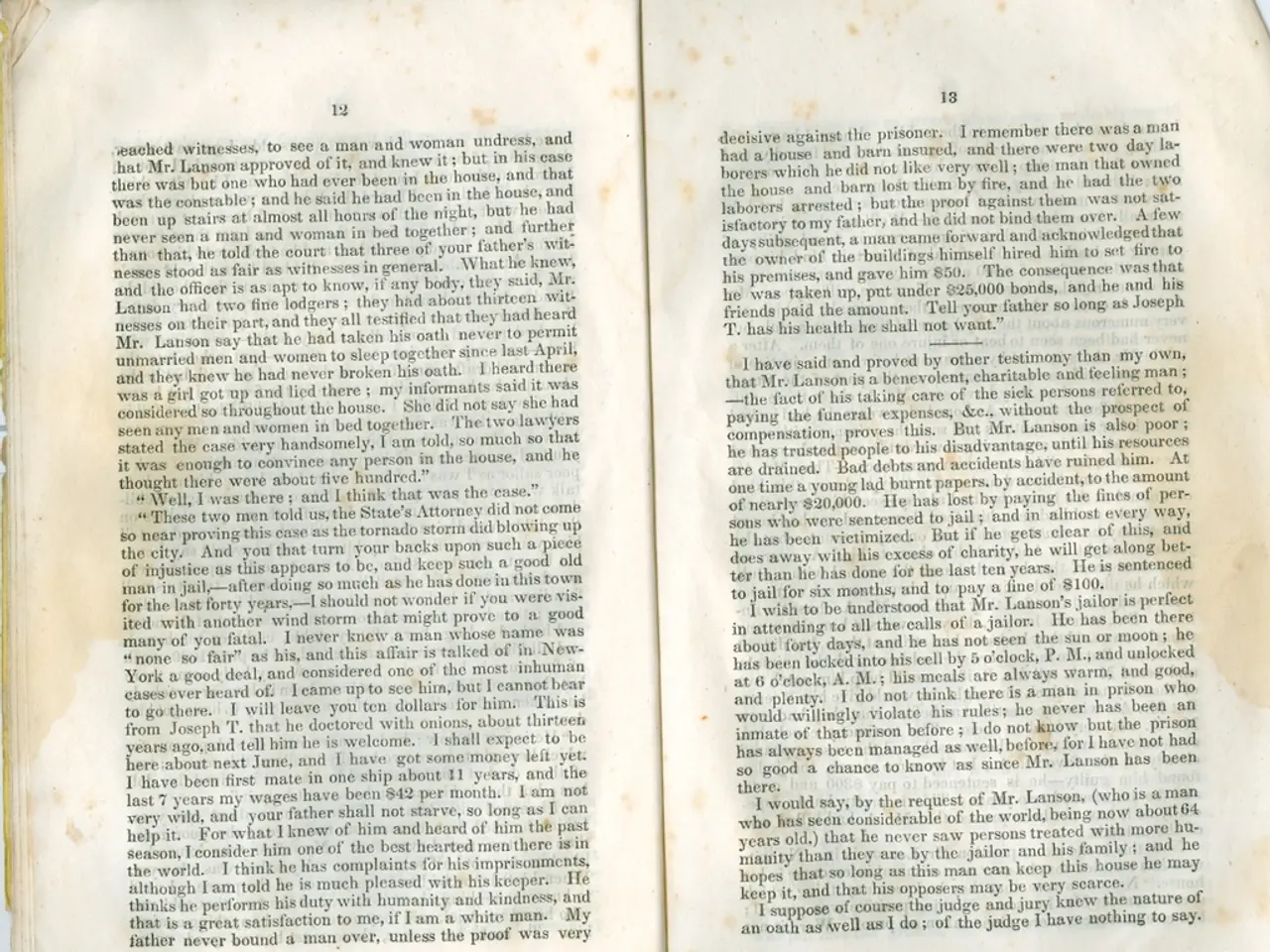Examining the Close Voter Registration Process in Bihar: A Look at the Intensive Review of Voter Lists for Election Integrity and Universal Adult Participation
The Election Commission of India (ECI) is set to conduct a Special Intensive Revision (SIR) of Bihar's electoral rolls in 2025, an exercise aimed at ensuring the accuracy and authenticity of the voter list. However, the process is not without its legal complexities.
Constitutional and Legal Basis
The ECI's authority to conduct the SIR is grounded in Article 324 of the Indian Constitution, which vests the Commission with the superintendence, direction, and control over elections, including the preparation and revision of electoral rolls. Article 326 guarantees the right to vote to all Indian citizens who are 18 years or older as of the qualifying date, establishing eligibility criteria to be enforced during revisions. The Representation of the People Act, 1950 (RPA) provides statutory backing, with sections such as 21, 16, and 15 outlining the powers and responsibilities of the ECI in conducting electoral roll revisions, setting disqualifications for voters, and mandating the preparation of the rolls under ECI's superintendence and control, respectively.
Qualifying Date
The ECI has set the qualifying date for the Bihar SIR as 1 July 2025. This date is crucial legally because the electoral roll revisions must reflect the voter population as of that date to maintain uniformity and legality in voter eligibility.
Constituency-Specific Special Revisions
The electoral rolls are prepared and revised on a constituency basis, with separate rolls for each assembly constituency and parliamentary constituency segments composed of these assembly segments. The ECI delegates responsibilities to designated officers at various administrative levels to conduct these revisions accurately and locally, ensuring legality and transparency at micro-levels.
Legal Challenges and Implications
The SIR in Bihar has been challenged in the Supreme Court on grounds that it may be arbitrary or unconstitutional, especially regarding the demand for fresh citizenship proof and potential exclusion of eligible voters. The court's outcome will shape the legal precedent on the scope of ECI's powers in conducting such revisions, particularly the balance between thoroughness in roll verification and the constitutional rights of citizens.
Accepting any two functional IDs plus one local witness as prima-facie proof can help where birth certificates are missing. However, the legal infirmity of the qualifying date of 1 July 2025 for the Bihar SIR lacks statutory backing. The Karnataka Sakala Act (2011) guarantees time-bound delivery of 1120 citizen services, and adding "voter roll correction" with a 15-day limit and automatic compensation for delay will make EROs accountable.
Conflating voter verification with nationality determination encroaches on the mandate of Foreigners' Tribunals and Courts. Adopting Uttar Pradesh's hospital-based instant birth-certificate model statewide can improve birth registration rates. Creating "Migrant Facilitation Desks" at railway stations and factory clusters can cut travel costs for 20 percent of Bihar's electorate that migrates seasonally.
Monsoon flooding affects 14 of 38 districts in Bihar, hindering field verification. Canada updates its National Register of Electors continuously through data-sharing (tax, driving licenses) without voter-initiated documentation. In the UK, the annual canvass uses household enquiry but allows self-attestation, and documentary proof is demanded only in suspicious cases.
South Africa uses smart-ID linkage but prohibits mass deletions within six months of an election. The Rules for a Model Electoral Roll (Deletion) should mandate a written show-cause notice, 30 days to reply, and a speaking order for every deletion. Section 21(3) permits constituency-specific, not State-wide special revisions. The National Register of Citizens (2019, Assam) resulted in 19 lakh exclusions due to massive documentation.
The Supreme Court held in the Assam intensive revision (2005) that prior inclusion creates a presumption of citizenship, and deletion requires notice and hearing. An offline-first ECINET mobile app with store-and-forward capability can avoid data gaps in flood-prone districts. Migrant workers, Muslim minorities, and Extremely Backward Classes with lower document possession indices are at risk in Bihar.
Parliament can amend Section 21 of the Representation of the People Act, 1950 to spell out triggers for State-wide Special Revisions. Requiring an annual, sample-based Social Audit by the Comptroller and Auditor General's empanelled CSOs can spotlight wrongful exclusions. Birth certificates exist for only 81 percent of Bihar births registered after 2005, creating a documentation burden for older cohorts. Rejection of ECI-issued Photo Voter ID undermines trust in earlier validations. 44 percent of Bihar's gram panchayats have patchy internet connectivity, creating a digital divide for ECINET upload.
In summary, the 2025 SIR of Bihar's electoral rolls rests on a firm legal foundation drawing from constitutional provisions and the Representation of the People Act, with the qualifying date of 1 July 2025 being pivotal for voter eligibility. The exercise is constituency-specific, involving detailed administrative controls. However, its implementation raises significant legal questions currently under Supreme Court review, particularly on the extent of documentation and verification powers the ECI may exercise during such special revisions.
- The 'Migrant Facilitation Desks' could help address the issue of high seasonal migration within Bihar, thereby increasing access to the electoral roll revision process.
- The adoption of 'smart-ID linkage' similar to South Africa could potentially streamline the electoral roll revision process, while avoiding mass deletions within six months of an election.
- The ECI could consider implementing 'self-attestation' in the annual canvass, like the UK, to reduce the burden of documentary proof required for voter verification.
- The implementation of an offline-first ECINET mobile app with store-and-forward capability could help manage data gaps in flood-prone districts, ensuring continuity during monsoon seasons.
- Enhancing 'personal growth' and 'learning' skills among the electoral officers (EROs) could lead to improvements in their efficiency and accountability, as seen with the Karnataka Sakala Act's service delivery guarantees.
- 'Productivity' could be increased by updating Bihar's electoral rolls more frequently, following the example of Canada's continuous National Register of Electors, relying on data-sharing to minimize voter-initiated documentation.
- 'Online-education' resources could be utilized to help individuals understand the electoral process and their rights, particularly those at risk of 'wrongful exclusion,' such as migrant workers, Muslim minorities, and Extremely Backward Classes.
- 'Career development' within the ECI could benefit from reorganizing special revisions on a state-wide level, as permitted under Section 21(3) of the Representation of the People Act, to optimize resources and ensure consistency.
- 'Policy-and-legislation' changes could include adding triggers for State-wide Special Revisions to the Representation of the People Act, as well as mandating annual, sample-based Social Audits by empanelled civil society organizations to ensure accountability and transparency.
- The 'goal-setting' and 'lifelong-learning' aspects in the electoral process could be strengthened by raising awareness about the importance of 'mindfulness' and maintaining up-to-date documentation to facilitate smooth and accurate electoral roll revisions.





